M12 Unit 3 Language in use-初中英语外研版九年级上册课件(共34张PPT,内嵌音频)
文档属性
| 名称 | M12 Unit 3 Language in use-初中英语外研版九年级上册课件(共34张PPT,内嵌音频) |

|
|
| 格式 | pptx | ||
| 文件大小 | 3.9MB | ||
| 资源类型 | 教案 | ||
| 版本资源 | 外研版 | ||
| 科目 | 英语 | ||
| 更新时间 | 2023-08-17 16:34:11 | ||
图片预览

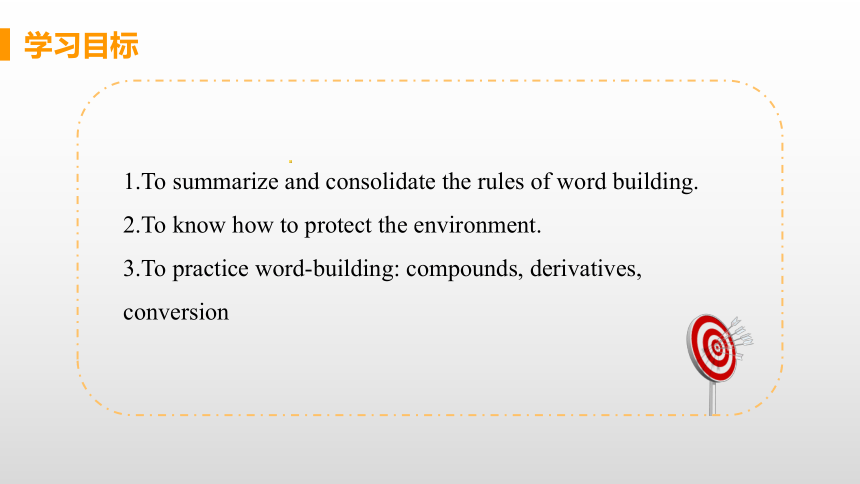
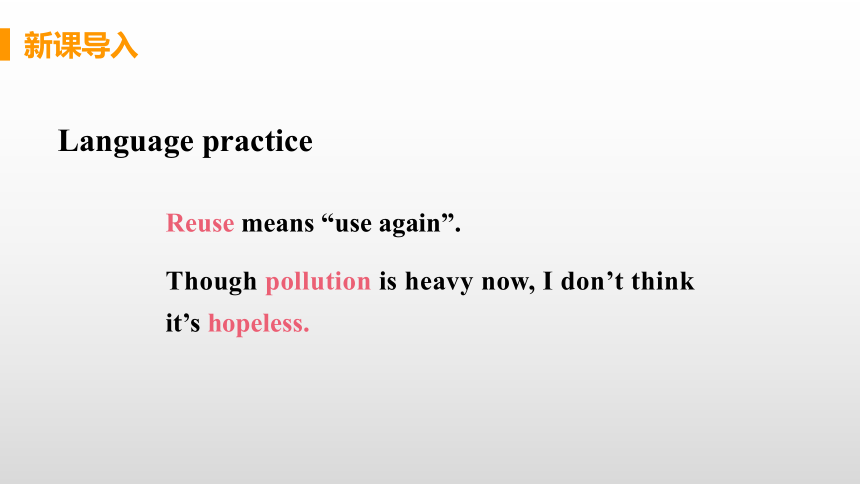
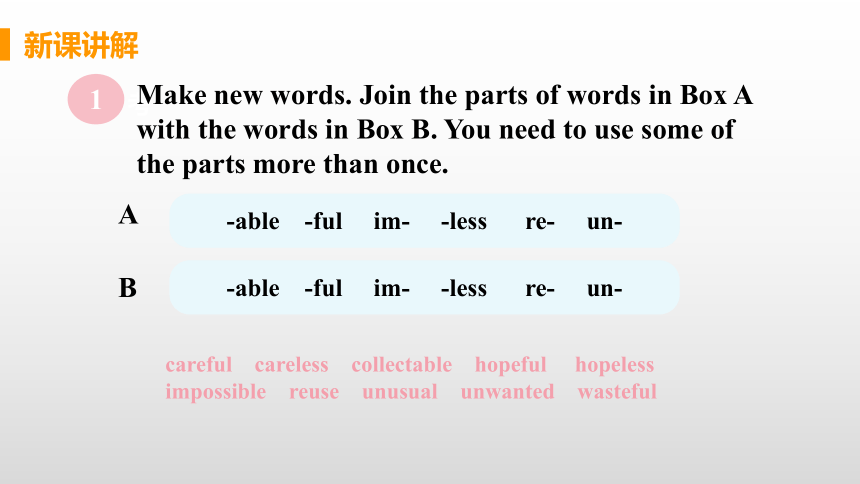
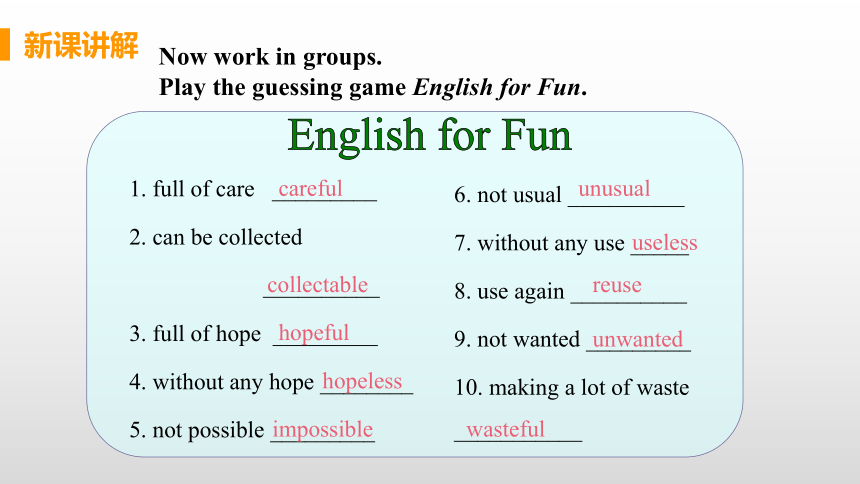
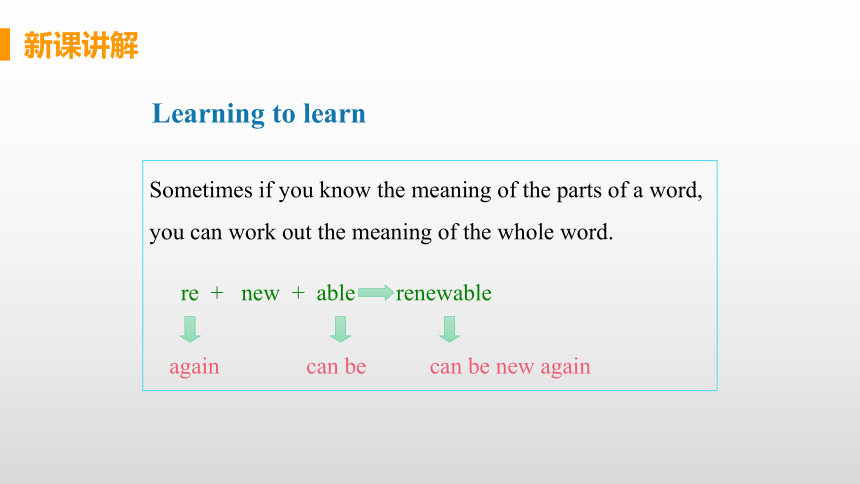
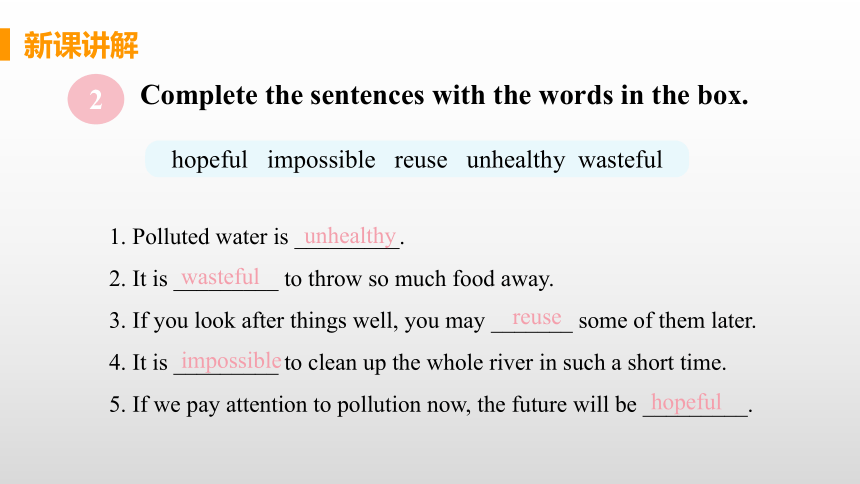
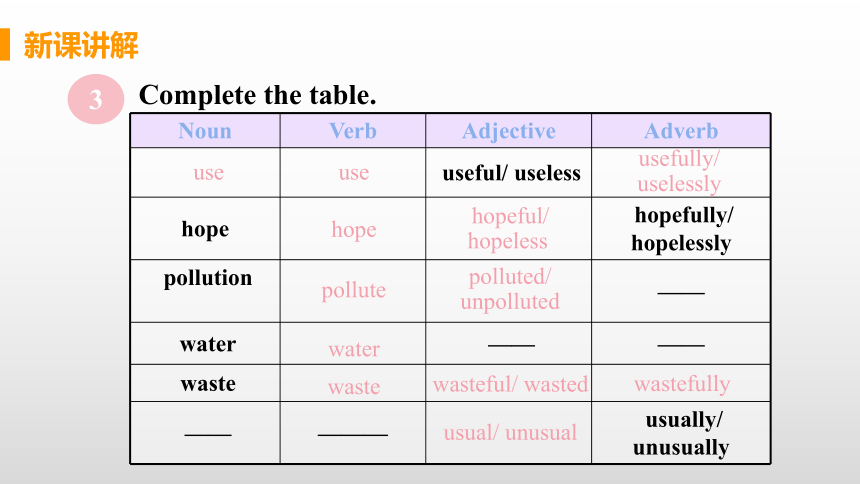
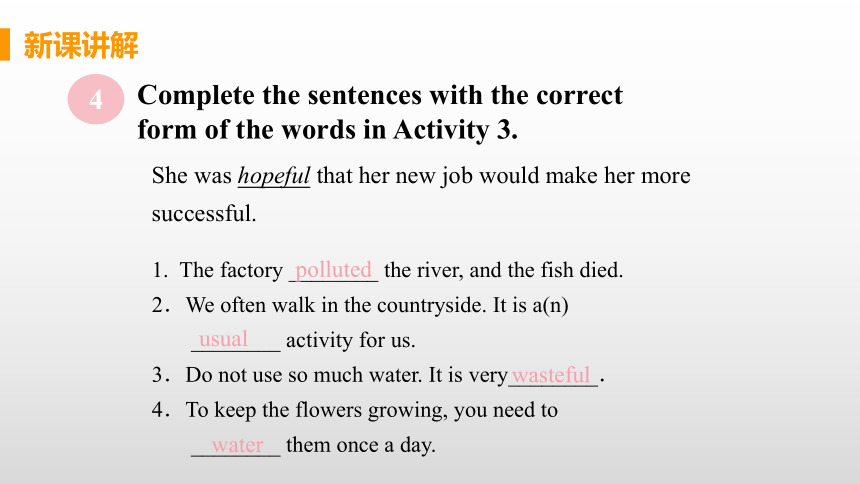
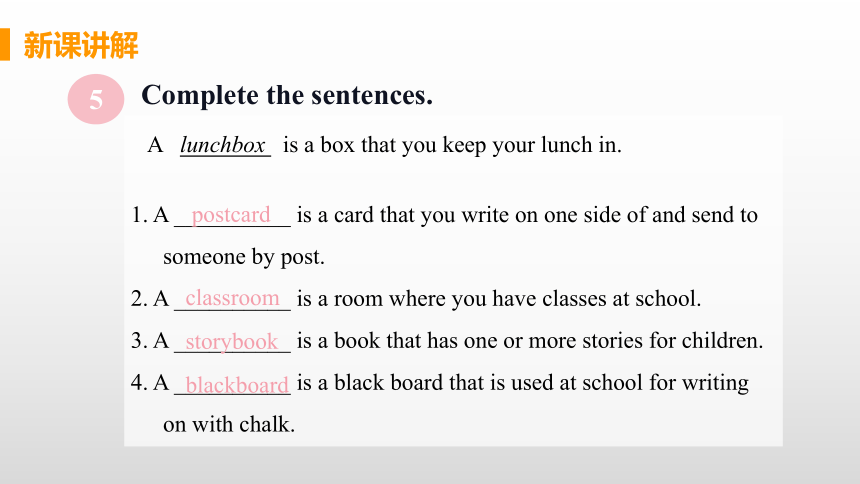
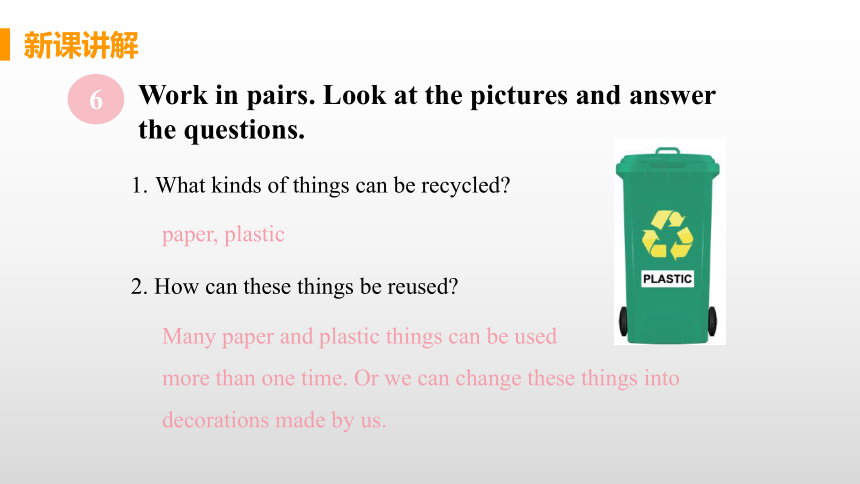
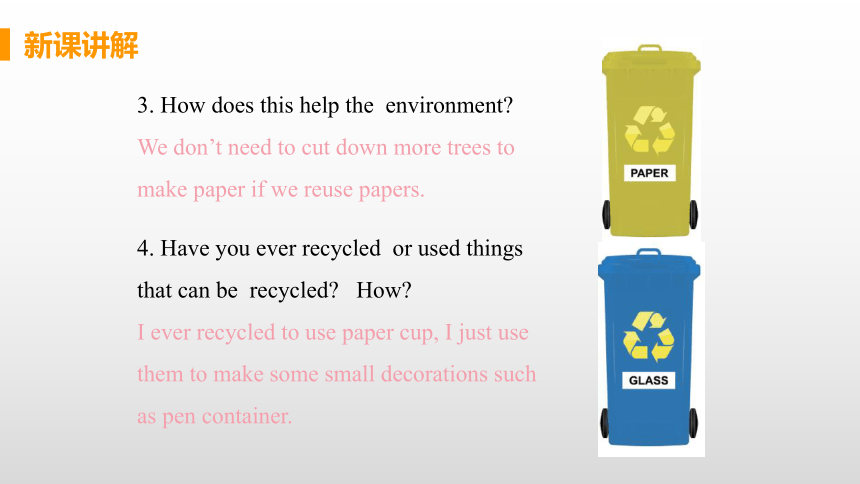
文档简介
(共34张PPT)
Module 12 Save our world
Unit 3 Language in use.
学习目标
1.To summarize and consolidate the rules of word building.
2.To know how to protect the environment.
3.To practice word-building: compounds, derivatives, conversion
新课导入
Language practice
Reuse means “use again”.
Though pollution is heavy now, I don’t think it’s hopeless.
思 考
新课讲解
1
Make new words. Join the parts of words in Box A with the words in Box B. You need to use some of the parts more than once.
-able -ful im- -less re- un-
-able -ful im- -less re- un-
A
B
careful careless collectable hopeful hopeless impossible reuse unusual unwanted wasteful
新课讲解
Now work in groups.
Play the guessing game English for Fun.
English for Fun
1. full of care _________
2. can be collected
__________
3. full of hope _________
4. without any hope ________
5. not possible _________
6. not usual __________
7. without any use _____
8. use again __________
9. not wanted _________
10. making a lot of waste ___________
careful
collectable
hopeful
hopeless
impossible
unusual
useless
reuse
unwanted
wasteful
新课讲解
Learning to learn
Sometimes if you know the meaning of the parts of a word, you can work out the meaning of the whole word.
re + new + able renewable
again
can be
can be new again
新课讲解
2
Complete the sentences with the words in the box.
hopeful impossible reuse unhealthy wasteful
1. Polluted water is _________.
2. It is _________ to throw so much food away.
3. If you look after things well, you may _______ some of them later.
4. It is _________ to clean up the whole river in such a short time.
5. If we pay attention to pollution now, the future will be _________.
unhealthy
wasteful
reuse
impossible
hopeful
新课讲解
Complete the table.
3
Noun Verb Adjective Adverb
useful/ useless
hope hopefully/ hopelessly
pollution ——
water —— ——
waste
—— ——— usually/ unusually
use
use
usefully/ uselessly
hope
hopeful/ hopeless
pollute
polluted/ unpolluted
water
waste
wasteful/ wasted
wastefully
usual/ unusual
新课讲解
4
Complete the sentences with the correct form of the words in Activity 3.
She was hopeful that her new job would make her more successful.
1. The factory ________ the river, and the fish died.
2.We often walk in the countryside. It is a(n)
________ activity for us.
3.Do not use so much water. It is very________.
4.To keep the flowers growing, you need to
________ them once a day.
polluted
usual
wasteful
water
新课讲解
5
Complete the sentences.
A lunchbox is a box that you keep your lunch in.
1. A __________ is a card that you write on one side of and send to someone by post.
2. A __________ is a room where you have classes at school.
3. A __________ is a book that has one or more stories for children.
4. A __________ is a black board that is used at school for writing on with chalk.
postcard
classroom
storybook
blackboard
新课讲解
6
Work in pairs. Look at the pictures and answer
the questions.
What kinds of things can be recycled
paper, plastic
2. How can these things be reused
Many paper and plastic things can be used
more than one time. Or we can change these things into decorations made by us.
新课讲解
3. How does this help the environment
We don’t need to cut down more trees to make paper if we reuse papers.
4. Have you ever recycled or used things that can be recycled How
I ever recycled to use paper cup, I just use them to make some small decorations such as pen container.
新课讲解
7
Complete the conversation with the correct form of the expressions in the box.
be good for throw away turn off worry about
MIKE: I hear you are off to the Caribbean for a holiday!
Lucky you! But aren’t you (1) _______________the pollution that such long plane journeys may cause for the environment
KEN: I know, but what can I do about it I’ve already tried my best to protect the environment. I recycle. I don’t (2) __________ things if I don’t want them any more. I (3)_________the lights when I leave a room. Don’t tell me I shouldn’t travel by plane any more!
worried about
throw away
turn off
新课讲解
Mike:No, of course not. But we can do more to protect the environment. For example, we can help keep the air clean by planting trees. Trees (4)____________the environment. In this way, we can reduce the harm of pollution.
Ken:Good! So I can enjoy my holiday, and when I come back, I’ll plant some trees!
Mike:That’s the idea! Maybe we can all join in and start a small forest!
are good for
新课讲解
8
Listen and check (√) the true sentences.
1. It is OK to throw used things away. Looking after them takes a lot of time.
2. Do not throw away things made of glass, plastic and paper, but recycle them when possible.
3. Take a bag when you go shopping.
4. Producing electricity and using oil will not cause pollution.
5. Turn off lights when you do not need them.
6. Ride a bike or walk, and do not often drive your car.
×
√
√
×
√
√
新课讲解
9
Listen again and complete the table.
Advice
1.Don't throw away things made of______________________,
but ________ them.
2.________ your plastic bags when you can and __________ with
you when you go shopping.
3.Use less electricity and oil to ________________.
4.Don't leave lights on and __________________.
5.______________ and do not often drive your car.
glass , plastic and paper
recycle
Reuse
take a bag
reduce pollution
waste electricity
Walk or cycle
新课讲解
Around the world
Earth Hour
Earth Hour is held toward the end of March each year. During Earth Hour, people all across the world switch off the lights they do not need. They do this to show their awareness of climate change.
The first Earth Hour was held in 2007 in Sydney, where more than 2.2 million people switched off their lights. Today, more and more cities are ta king part in the event, such as Beijing, London, Rome and New York, and landmarks like the Empire State Building and the Golden Gate Bridge will go dark.
新课讲解
10
Work in groups. Decide what kind of pollution you want to talk about.
Choose a subject that you care about the most. It could be water pollution, air pollution, etc.
Find out more information about your subject. Look it up on a website or in a books.
新课讲解
11
Discuss your subject.
Take turns to say what you think about the problem and what can be done.
Listen to what others say. If you agree with what they have said, say “I agree”, “That’s true” or “That’s a good point”; if you do not agree with what someone says , say “I’m sorry, but I don’t agree. I think that ...”
12
Present your group’s ideas to the whole class.
新课讲解
work out解决;计算;产生结果;设计出
Point
Language points 1
eg:The plan worked out badly.
计划实施得很不成功。
See if you can work out this problem.
看你能不能解出这道难题。
新课讲解
go dark 变暗
Point
Language points 2
这里的go为系动词。英语系动词的功能主要是把表语和主语联系在一起,说明主语的属性、特征或状态。系动词不能在句中独立作谓语,必须和后面的表语一起构成句子的谓语。
考点1 :
某些含有变化意义的动态系动词如get, become, grow, turn等的进行时态可与形容词的比较级连用,表示渐进过程,其意思是“越来越……”。
eg:He is growing taller and taller.
他长得越来越高了。
Our life is getting better and better.
我们的生活越来越好了。
新课讲解
go dark 变暗
Point
Language points 2
考点2 :
后接过去分词可构成系表结构。
eg:John got wounded while playing football last Saturday.
约翰上周六踢足球时受了伤。
考点3 :
易混系动词的区别
get, become, go, turn, grow“变得”
考点3 :
get :“变得”,在口语中用得很多。
become :“变成,成为(好坏情况均可)”。后接形容词、名词、过去分词作表语。
go :“变得(某种由好到坏的情况)”,可表示颜色的变化或语态的变化。
turn :“变成”,强调与原来不同的、新的变化,如变质、变色等。
grow :“逐渐变得……”,强调其变化过程.
新课讲解
care for与care about的意义、用法区别
Point
Language points 3
care about 在乎,关心 I don't care about your opinion.
我不在乎你的意见。
Don't you care about anybody
你难道谁也不关心吗?
care for 喜欢,照顾 She doesn't care for that colour.
她不喜欢那种颜色。
He cared for his sick mother day and
night.
他日夜照顾生病的母亲。
新课讲解
GRAMMER
英语中常见的构词法:
1.合成法
2. 派生法 (加前缀、后缀)
3. 转化法(词性变词形不变)
新课讲解
GRAMMER
1. 合成法
将两个或两个以上独立且语义不同的单词合在一起构成新词的方法称作合成法。
合成名词 afternoon, sportsman, blackboard, newspaper, airplane, classmate…
合成形容词 kind-hearted, middle-aged, hard-working…
合成副词 however, maybe…
合成代词 himself, everyone, nothing…
合成动词 overlook…
新课讲解
GRAMMER
2. 派生法
在一个单词前或后加上一个词缀,就可以构成一个新词。 根据词缀的位置,分为前缀和后缀两种。掌握一些常见的词缀,对单词的记忆和理解有很大的帮助。比如:我们学会care, 就能掌握careful, careless, carefully, carelessly。
下面我们来学习几个常见的前、后缀:
新课讲解
GRAMMER
前缀:
词根 re- in(m)- un- dis-
意义 再/又 不/无 不/无 不/无
例子 rewrite incorrect uneasy dislike
reuse impossible impolite untrue disagree
新课讲解
GRAMMER
词根 inter- super- anti-
意义 互相 超 反对;防止
例子 inter national superman anti-war
internet supermarket superstar anti-pollution
新课讲解
GRAMMER
后缀:
常见名词后缀:
(1). –an:
American (美国人), Indian(印度人),
Canadian(加拿大),Italian(意大利人)
(2). –er:
worker (工人), driver(司机),
teacher(教师),player(选手)
(3). –ess:
actress (女演员), waitress(女服务员)
(4). –ness:
illness (疾病), homelessness(无家可归),
kindness (慈祥), happiness(幸福)
(5). –or:
actor (男演员), visitor(参观者),
(6). –ance:
appearance (出现),
performance(表演)
(7). –ment: agreement (同意),
新课讲解
GRAMMER
后缀:
常见形容词后缀:
(1). –ful:
helpful(有帮助的), hopeful(有希望的),
powerful(有力量的) ,useful(有用的),
(2). –less:
helpless(无帮助的), hopeless (无希望的), powerless(无力量的),useless(无用的),
(3). –ly: friendly(有好的), lovely(可爱的)
(4). –ing:
interesting(有趣的), exciting(激动人心的), boring(无聊的)
(5). –ed:
interested(感兴趣的), surprised(吃惊的)
新课讲解
GRAMMER
3. 转换法
英语构词法中把一种词性用作另一种词性而词形不变的方法叫做转换法。
1. 名词转化为动词。
Your hand looks badly burnt.
你的手似乎烧伤很重。
He handed me a little rectangle of white paper.
他递给我一张小小的长方形白纸片。
2. 形容词转化为动词。
The stadium emptied at the end of the first day of athletics.
首日体育比赛结束后, 体育场空无一人。
当堂小练
一、用所给词的适当形式填空
1. The farmers often water crops to keep them (grow).
2. We should try our best (protect)our environment.
3.(广东)It is (usual)for a four year old boy to write poems so well.
4. (南通)To make a green world,we should try to reduce air ________(pollute)by walking moreand driving less.
5. (兰州)This (wood)bridge was built more than 20 years ago.
growing
to protect
unusual
pollution
wooden
当堂小练
二、根据汉语提示完成句子
6. He can’t finish the work __________________ (在如此短的时间里).
7.(改编·广州)You've (算出)the maths problem yourselves. What clever children you are!
8.Will you (参加)the school sports meeting next Friday?
9. Eating more vegetables (对……有好处)our bodies.
10. We should (注意听)to the teacher in class.
in such a short time
worked out
take part in
is good for
pay attention to listening
课堂小结
Key Phrases
clean up ;
not...any more ;
try one's best;
in this way
Key sentences
If we pay attention to pollution now,the future will be hopeful.
Key words
hopeful, wasteful, impossible, unhealthy
Module 12 Save our world
Unit 3 Language in use.
学习目标
1.To summarize and consolidate the rules of word building.
2.To know how to protect the environment.
3.To practice word-building: compounds, derivatives, conversion
新课导入
Language practice
Reuse means “use again”.
Though pollution is heavy now, I don’t think it’s hopeless.
思 考
新课讲解
1
Make new words. Join the parts of words in Box A with the words in Box B. You need to use some of the parts more than once.
-able -ful im- -less re- un-
-able -ful im- -less re- un-
A
B
careful careless collectable hopeful hopeless impossible reuse unusual unwanted wasteful
新课讲解
Now work in groups.
Play the guessing game English for Fun.
English for Fun
1. full of care _________
2. can be collected
__________
3. full of hope _________
4. without any hope ________
5. not possible _________
6. not usual __________
7. without any use _____
8. use again __________
9. not wanted _________
10. making a lot of waste ___________
careful
collectable
hopeful
hopeless
impossible
unusual
useless
reuse
unwanted
wasteful
新课讲解
Learning to learn
Sometimes if you know the meaning of the parts of a word, you can work out the meaning of the whole word.
re + new + able renewable
again
can be
can be new again
新课讲解
2
Complete the sentences with the words in the box.
hopeful impossible reuse unhealthy wasteful
1. Polluted water is _________.
2. It is _________ to throw so much food away.
3. If you look after things well, you may _______ some of them later.
4. It is _________ to clean up the whole river in such a short time.
5. If we pay attention to pollution now, the future will be _________.
unhealthy
wasteful
reuse
impossible
hopeful
新课讲解
Complete the table.
3
Noun Verb Adjective Adverb
useful/ useless
hope hopefully/ hopelessly
pollution ——
water —— ——
waste
—— ——— usually/ unusually
use
use
usefully/ uselessly
hope
hopeful/ hopeless
pollute
polluted/ unpolluted
water
waste
wasteful/ wasted
wastefully
usual/ unusual
新课讲解
4
Complete the sentences with the correct form of the words in Activity 3.
She was hopeful that her new job would make her more successful.
1. The factory ________ the river, and the fish died.
2.We often walk in the countryside. It is a(n)
________ activity for us.
3.Do not use so much water. It is very________.
4.To keep the flowers growing, you need to
________ them once a day.
polluted
usual
wasteful
water
新课讲解
5
Complete the sentences.
A lunchbox is a box that you keep your lunch in.
1. A __________ is a card that you write on one side of and send to someone by post.
2. A __________ is a room where you have classes at school.
3. A __________ is a book that has one or more stories for children.
4. A __________ is a black board that is used at school for writing on with chalk.
postcard
classroom
storybook
blackboard
新课讲解
6
Work in pairs. Look at the pictures and answer
the questions.
What kinds of things can be recycled
paper, plastic
2. How can these things be reused
Many paper and plastic things can be used
more than one time. Or we can change these things into decorations made by us.
新课讲解
3. How does this help the environment
We don’t need to cut down more trees to make paper if we reuse papers.
4. Have you ever recycled or used things that can be recycled How
I ever recycled to use paper cup, I just use them to make some small decorations such as pen container.
新课讲解
7
Complete the conversation with the correct form of the expressions in the box.
be good for throw away turn off worry about
MIKE: I hear you are off to the Caribbean for a holiday!
Lucky you! But aren’t you (1) _______________the pollution that such long plane journeys may cause for the environment
KEN: I know, but what can I do about it I’ve already tried my best to protect the environment. I recycle. I don’t (2) __________ things if I don’t want them any more. I (3)_________the lights when I leave a room. Don’t tell me I shouldn’t travel by plane any more!
worried about
throw away
turn off
新课讲解
Mike:No, of course not. But we can do more to protect the environment. For example, we can help keep the air clean by planting trees. Trees (4)____________the environment. In this way, we can reduce the harm of pollution.
Ken:Good! So I can enjoy my holiday, and when I come back, I’ll plant some trees!
Mike:That’s the idea! Maybe we can all join in and start a small forest!
are good for
新课讲解
8
Listen and check (√) the true sentences.
1. It is OK to throw used things away. Looking after them takes a lot of time.
2. Do not throw away things made of glass, plastic and paper, but recycle them when possible.
3. Take a bag when you go shopping.
4. Producing electricity and using oil will not cause pollution.
5. Turn off lights when you do not need them.
6. Ride a bike or walk, and do not often drive your car.
×
√
√
×
√
√
新课讲解
9
Listen again and complete the table.
Advice
1.Don't throw away things made of______________________,
but ________ them.
2.________ your plastic bags when you can and __________ with
you when you go shopping.
3.Use less electricity and oil to ________________.
4.Don't leave lights on and __________________.
5.______________ and do not often drive your car.
glass , plastic and paper
recycle
Reuse
take a bag
reduce pollution
waste electricity
Walk or cycle
新课讲解
Around the world
Earth Hour
Earth Hour is held toward the end of March each year. During Earth Hour, people all across the world switch off the lights they do not need. They do this to show their awareness of climate change.
The first Earth Hour was held in 2007 in Sydney, where more than 2.2 million people switched off their lights. Today, more and more cities are ta king part in the event, such as Beijing, London, Rome and New York, and landmarks like the Empire State Building and the Golden Gate Bridge will go dark.
新课讲解
10
Work in groups. Decide what kind of pollution you want to talk about.
Choose a subject that you care about the most. It could be water pollution, air pollution, etc.
Find out more information about your subject. Look it up on a website or in a books.
新课讲解
11
Discuss your subject.
Take turns to say what you think about the problem and what can be done.
Listen to what others say. If you agree with what they have said, say “I agree”, “That’s true” or “That’s a good point”; if you do not agree with what someone says , say “I’m sorry, but I don’t agree. I think that ...”
12
Present your group’s ideas to the whole class.
新课讲解
work out解决;计算;产生结果;设计出
Point
Language points 1
eg:The plan worked out badly.
计划实施得很不成功。
See if you can work out this problem.
看你能不能解出这道难题。
新课讲解
go dark 变暗
Point
Language points 2
这里的go为系动词。英语系动词的功能主要是把表语和主语联系在一起,说明主语的属性、特征或状态。系动词不能在句中独立作谓语,必须和后面的表语一起构成句子的谓语。
考点1 :
某些含有变化意义的动态系动词如get, become, grow, turn等的进行时态可与形容词的比较级连用,表示渐进过程,其意思是“越来越……”。
eg:He is growing taller and taller.
他长得越来越高了。
Our life is getting better and better.
我们的生活越来越好了。
新课讲解
go dark 变暗
Point
Language points 2
考点2 :
后接过去分词可构成系表结构。
eg:John got wounded while playing football last Saturday.
约翰上周六踢足球时受了伤。
考点3 :
易混系动词的区别
get, become, go, turn, grow“变得”
考点3 :
get :“变得”,在口语中用得很多。
become :“变成,成为(好坏情况均可)”。后接形容词、名词、过去分词作表语。
go :“变得(某种由好到坏的情况)”,可表示颜色的变化或语态的变化。
turn :“变成”,强调与原来不同的、新的变化,如变质、变色等。
grow :“逐渐变得……”,强调其变化过程.
新课讲解
care for与care about的意义、用法区别
Point
Language points 3
care about 在乎,关心 I don't care about your opinion.
我不在乎你的意见。
Don't you care about anybody
你难道谁也不关心吗?
care for 喜欢,照顾 She doesn't care for that colour.
她不喜欢那种颜色。
He cared for his sick mother day and
night.
他日夜照顾生病的母亲。
新课讲解
GRAMMER
英语中常见的构词法:
1.合成法
2. 派生法 (加前缀、后缀)
3. 转化法(词性变词形不变)
新课讲解
GRAMMER
1. 合成法
将两个或两个以上独立且语义不同的单词合在一起构成新词的方法称作合成法。
合成名词 afternoon, sportsman, blackboard, newspaper, airplane, classmate…
合成形容词 kind-hearted, middle-aged, hard-working…
合成副词 however, maybe…
合成代词 himself, everyone, nothing…
合成动词 overlook…
新课讲解
GRAMMER
2. 派生法
在一个单词前或后加上一个词缀,就可以构成一个新词。 根据词缀的位置,分为前缀和后缀两种。掌握一些常见的词缀,对单词的记忆和理解有很大的帮助。比如:我们学会care, 就能掌握careful, careless, carefully, carelessly。
下面我们来学习几个常见的前、后缀:
新课讲解
GRAMMER
前缀:
词根 re- in(m)- un- dis-
意义 再/又 不/无 不/无 不/无
例子 rewrite incorrect uneasy dislike
reuse impossible impolite untrue disagree
新课讲解
GRAMMER
词根 inter- super- anti-
意义 互相 超 反对;防止
例子 inter national superman anti-war
internet supermarket superstar anti-pollution
新课讲解
GRAMMER
后缀:
常见名词后缀:
(1). –an:
American (美国人), Indian(印度人),
Canadian(加拿大),Italian(意大利人)
(2). –er:
worker (工人), driver(司机),
teacher(教师),player(选手)
(3). –ess:
actress (女演员), waitress(女服务员)
(4). –ness:
illness (疾病), homelessness(无家可归),
kindness (慈祥), happiness(幸福)
(5). –or:
actor (男演员), visitor(参观者),
(6). –ance:
appearance (出现),
performance(表演)
(7). –ment: agreement (同意),
新课讲解
GRAMMER
后缀:
常见形容词后缀:
(1). –ful:
helpful(有帮助的), hopeful(有希望的),
powerful(有力量的) ,useful(有用的),
(2). –less:
helpless(无帮助的), hopeless (无希望的), powerless(无力量的),useless(无用的),
(3). –ly: friendly(有好的), lovely(可爱的)
(4). –ing:
interesting(有趣的), exciting(激动人心的), boring(无聊的)
(5). –ed:
interested(感兴趣的), surprised(吃惊的)
新课讲解
GRAMMER
3. 转换法
英语构词法中把一种词性用作另一种词性而词形不变的方法叫做转换法。
1. 名词转化为动词。
Your hand looks badly burnt.
你的手似乎烧伤很重。
He handed me a little rectangle of white paper.
他递给我一张小小的长方形白纸片。
2. 形容词转化为动词。
The stadium emptied at the end of the first day of athletics.
首日体育比赛结束后, 体育场空无一人。
当堂小练
一、用所给词的适当形式填空
1. The farmers often water crops to keep them (grow).
2. We should try our best (protect)our environment.
3.(广东)It is (usual)for a four year old boy to write poems so well.
4. (南通)To make a green world,we should try to reduce air ________(pollute)by walking moreand driving less.
5. (兰州)This (wood)bridge was built more than 20 years ago.
growing
to protect
unusual
pollution
wooden
当堂小练
二、根据汉语提示完成句子
6. He can’t finish the work __________________ (在如此短的时间里).
7.(改编·广州)You've (算出)the maths problem yourselves. What clever children you are!
8.Will you (参加)the school sports meeting next Friday?
9. Eating more vegetables (对……有好处)our bodies.
10. We should (注意听)to the teacher in class.
in such a short time
worked out
take part in
is good for
pay attention to listening
课堂小结
Key Phrases
clean up ;
not...any more ;
try one's best;
in this way
Key sentences
If we pay attention to pollution now,the future will be hopeful.
Key words
hopeful, wasteful, impossible, unhealthy
同课章节目录
- Module 1 Wonders of the world
- Unit 1 It's more than 2,000 years old.
- Unit 2 The Grand Canyon was not just big.
- Unit 3 Language in use
- Module 2 Public holidays
- Unit 1 My family always go somewhere interesting a
- Unit 2 We have celebrated the festival since the f
- Unit 3 Language in use
- Module 3 Heroes
- Unit 1 She trained hard,so she became a great play
- Unit 2There were few doctors, so he had to work ve
- Unit 3 Language in use
- Module 4 Home alone
- Unit 1 I can look after myself, although it won’t
- Unit 2 I became so bored with their orders that I
- Unit 3 Language in use
- Module 5 Museums
- Unit 1 Don't cross that rope!
- Unit 2 If you ever go to London, make sure you vis
- Unit 3 Language in use
- Module 6 Problems
- Unit 1 If I start after dinner, I'll finish it be
- Unit 2 If you tell him the truth now, you will sho
- Unit 3 Language in use
- Revision Module A
- Module 7 Great books
- Unit 1 We're still influenced by Confucius's idea
- Unit 2 It is still read and loved.
- Unit 3 Language in use
- Module 8 Sports life
- Unit 1 Daming wasn't chosen for the team last time
- Unit 2 He was invited to competitions around the w
- Unit 3 Language in use
- Module 9 Great inventions
- Unit 1 Will computers be used more than books in t
- Unit 2 Will books be replaced by the Internet?
- Unit 3 Language in use
- Module 10 Australia
- Unit 1 I have some photos that I took in Australia
- Unit 2 The game that they like most is Australian
- Unit 3 Language in use
- Module 11 Photos
- Unit 1 He's the boy who won the photo competition
- Unit 2 The photo which we liked best was taken by
- Unit 3 Language in use
- Module 12 Save our world
- Unit 1 If everyone starts to do something, the wor
- Unit 2 Repeat these three words daily: reduce, reu
- Unit 3 Language in use
- Revision Module B
